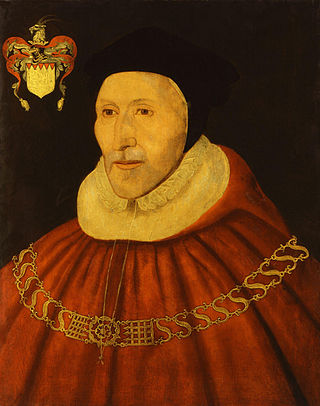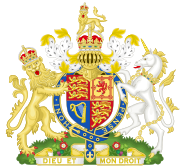
In law, common law is the body of law created by judges and similar quasi-judicial tribunals by virtue of being stated in written opinions.

English law is the common law legal system of England and Wales, comprising mainly criminal law and civil law, each branch having its own courts and procedures.

Sir William Blackstone was an English jurist, justice and Tory politician most noted for his Commentaries on the Laws of England, which became the best-known description of the doctrines of the English common law. Born into a middle-class family in London, Blackstone was educated at Charterhouse School before matriculating at Pembroke College, Oxford, in 1738. After switching to and completing a Bachelor of Civil Law degree, he was made a fellow of All Souls College, Oxford, on 2 November 1743, admitted to Middle Temple, and called to the Bar there in 1746. Following a slow start to his career as a barrister, Blackstone became heavily involved in university administration, becoming accountant, treasurer and bursar on 28 November 1746 and Senior Bursar in 1750. Blackstone is considered responsible for completing the Codrington Library and Warton Building, and simplifying the complex accounting system used by the college. On 3 July 1753 he formally gave up his practice as a barrister and instead embarked on a series of lectures on English law, the first of their kind. These were massively successful, earning him a total of £453, and led to the publication of An Analysis of the Laws of England in 1756, which repeatedly sold out and was used to preface his later works.
A legal fiction is a fact assumed or created by courts, which is then used in order to help reach a decision or to apply a legal rule.

The Commentaries on the Laws of England are an influential 18th-century treatise on the common law of England by Sir William Blackstone, originally published by the Clarendon Press at Oxford between 1765 and 1769. The work is divided into four volumes, on the rights of persons, the rights of things, of private wrongs and of public wrongs.
Landmark court decisions, in present-day common law legal systems, establish precedents that determine a significant new legal principle or concept, or otherwise substantially affect the interpretation of existing law. "Leading case" is commonly used in the United Kingdom and other Commonwealth jurisdictions instead of "landmark case", as used in the United States.

Gleaning is the act of collecting leftover crops from farmers' fields after they have been commercially harvested or on fields where it is not economically profitable to harvest. It is a practice described in the Hebrew Bible that became a legally enforced entitlement of the poor in a number of Christian kingdoms. Modern day "dumpster diving", when done for food or culinary ingredients, is seen as a similar form of food recovery. Gleaning is also still used to provide nutritious harvested foods for those in need. In the United States, it is used due to the need for a national network to aid food recovery organizations. This is called the National Gleaning Project, which was started by the Center for Agriculture and Food Systems at Vermont Law and Graduate School to aid those less fortunate much like the old Christian Kingdoms.
Coverture was a legal doctrine in the English common law in which a married woman's legal existence was considered to be merged with that of her husband, so that she had no independent legal existence of her own. Upon marriage, coverture provided that a woman became a feme covert, whose legal rights and obligations were mostly subsumed by those of her husband. An unmarried woman, or feme sole, had the right to own property and make contracts in her own name.

Thomas Bonham v College of Physicians, commonly known as Dr. Bonham's Case or simply Bonham's Case, was a case decided in 1610 by the Court of Common Pleas in England, under Sir Edward Coke, the court's Chief Justice, in which it was ruled that Dr. Bonham had been wrongfully imprisoned by the College of Physicians for practising medicine without a licence. Dr. Bonham's attorneys had argued that imprisonment was reserved for malpractice not illicit practice, with Coke agreeing in the majority opinion.

Sir James Dyer was a judge and Speaker of the House of Commons during the reign of Edward VI of England.
West v. Barnes, 2 U.S. 401 (1791), was the first United States Supreme Court decision and the earliest case calling for oral argument. Van Staphorst v. Maryland (1791) was docketed prior to West v. Barnes but settled before the Court heard the case: West was argued on August 2 and decided on August 3, 1791. Collet v. Collet (1792) was the first appellate case docketed with the Court but was dropped before it could be heard. Supreme Court Reporter Alexander Dallas did not publish the justices' full opinions in West v. Barnes, which were published in various newspapers around the country at the time, but he published an abbreviated summary of the decision.
In law, a moiety title is the ownership of part of a property. The word derives from Old French moitié, "half", from Latin medietas ("middle"), from medius.

Timworth is a village and civil parish 65 mi (105 km) north east of London and 26 mi (42 km) east of Cambridge in the West Suffolk district of Suffolk in eastern England. Located around two miles north of Bury St Edmunds, its 2005 population was 50. At the 2011 Census the appropriate Postal Code showed the population as being included in Ampton.
The hobbit is a unit of volume or weight formerly used in Wales for trade in grain and other staples. It was equal to two and a half bushels, but was also often used as a unit of weight, which varied depending on the material being measured. The hobbit remained in customary use in markets in northern Wales after Parliament standardized the Winchester bushel as the unit of measure for grain, after which courts gave inconsistent rulings as to its legal status.
Sir William Henry Ashurst (1725–1807) was an English judge.

Steel v Houghton (1788) 1 H Bl 51; 126 ER 32 is a landmark judgment in English law by the House of Lords that is considered to mark the modern legal understanding of private property rights. Ostensibly the matter found that no person has a right at common law to glean the harvest of a private field, but the judgment has been taken to be a more general precedent for private land matters.

Sir James Hales was an English judge from Kent, the son of the politician and judge John Hales. Though a Protestant, he refused to seal the document settling the crown on the Protestant claimant Lady Jane Grey in 1553, and during the following reign of the Catholic Queen Mary opposed the relaxation of the laws against religious nonconformity. Imprisoned for his lack of sympathy to Catholicism and subjected to intense pressure to convert, in a disturbed state of mind he committed suicide by drowning. The resulting lawsuit of Hales v. Petit is considered to be a source of the gravediggers' dialogue after Ophelia drowns herself in Shakespeare's play Hamlet.
A presumption of guilt is any presumption within the criminal justice system that a person is guilty of a crime, for example a presumption that a suspect is guilty unless or until proven to be innocent. Such a presumption may legitimately arise from a rule of law or a procedural rule of the court or other adjudicating body which determines how the facts in the case are to be proved, and may be either rebuttable or irrebuttable. An irrebuttable presumption of fact may not be challenged by the defense, and the presumed fact is taken as having been proved. A rebuttable presumption shifts the burden of proof onto the defense, who must collect and present evidence to prove the suspect's innocence, in order to obtain acquittal.










